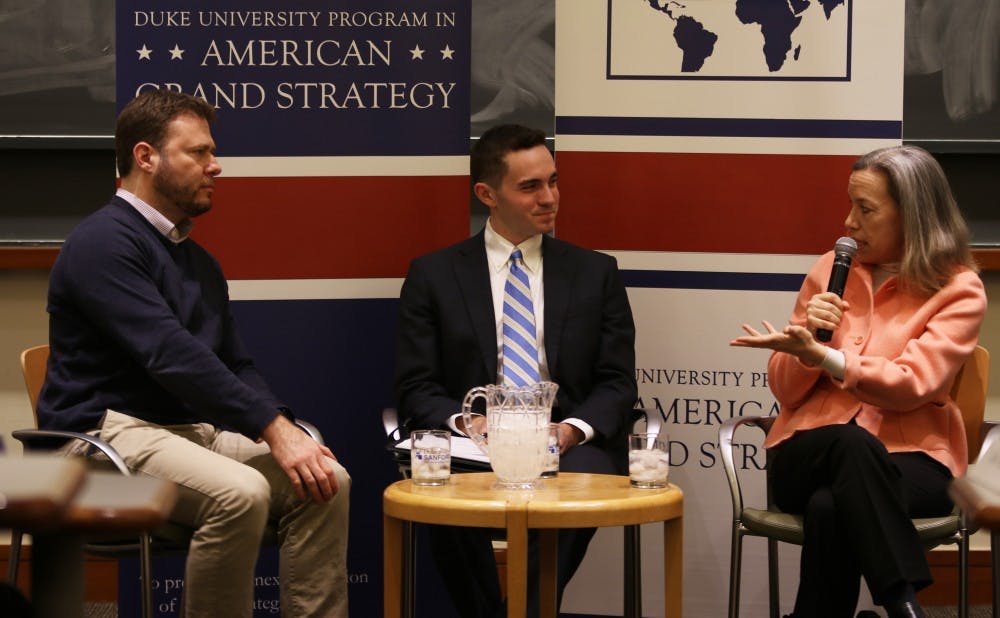Ismail Royer, a convicted jihadist, and Jennifer Bryson, a former Guantanamo Bay interrogator, could not be more different.
Yet the two are great friends—so much so, that two weeks ago, Bryson attended Royer's wedding. They spoke together at the Sanford School of Public Policy on their experiences and insights into extremism Tuesday night, hours before President Donald Trump signed an executive order to keep Guantanamo Bay open.
The two speakers initially met when Bryson read a blog post Royer had written. At the time, Bryson had no idea about the 13 and a half years Royer spent in prison as a convicted jihadist. But the piece resonated with her, and Bryson sent Royer a friend request on Facebook, which he accepted.
A few months later, Royer shared an Associated Press article on Facebook about when he left prison. Bryson saw it, read it and thought that Royer sounded a lot like herself.
"I just thought: I really want to meet this person. But, I thought, there's no way," Bryson said.
Bryson messaged him on Facebook and mentioned to him right up front who she was. They met a few days later and after speaking for a few hours, she hired him to work for her at the Center for Islam and Religious Freedom.
Bryson's background
Bryson did not plan to become an interrogator. In 2003, she went to work for the Defense Intelligence Agency in Human Intelligence Collection.
"They initially assigned me to an office where they had no use for me to be there. By 2003—this is post 9/11—and we're in Iraq and I'm sitting there with a Ph.D. in Arabic and Islamic Studies, trying to bring books to the office to read because I have nothing to do," Bryson said.
At the time, there were no interrogation trainings for civilians, Bryson said. Yet it was decided that she would be put in a six-week class to become an interrogator in the fall of 2003.
Following the class, she arrived at Guantanamo Bay in 2004.
"It was at first a bit of a shock for me," she said of her arrival. "I was placed in a supervisory position…I supervised all of the interrogators and analysts working with the Saudis…I had to improve the interrogation plans for these interrogators."
Royer's background
After growing up in St. Louis, Royer left for Bosnia during the Bosnian War and fought several battles as a guerrilla fighter. After moving to Virginia, he then travelled to Pakistan to where he met with the Lashkar-e-Taiba a militant Islamist group, which U.S. authorities later classified as a terrorist organization. He later returned to Virginia and became a member of the "Virginia Jihad Network," which helped train extremists to participate in violent jihad.
But after 9/11, Royer was advised to leave the United States, so he fled to Bosnia.
"Even though none of us really supported the 9/11 attacks, we did feel a sense that we needed to go be in the Muslim world and leave this non-Muslim land," Royer said.
But once he failed to get a Pakistani visa, Royer returned to the United States the following year in 2002. With his return came questioning from the Federal Bureau of Investigation.
"They started raiding people's houses," Royer said. "They didn't raid my house until later…[but] it was clear that I was going to go to prison."
In June 2003, Royer was arrested and pleaded guilty. He was sentenced to 20 years in prison but was released after 13 and a half years for good behavior. Royer lived among many other terrorists in prison. Two included the "Unabomber," Ted Kaczynski—who carried out a deadly bombing campaign across the U.S.—and the "shoe bomber" Richard Reid—who tried to ignite explosives on a flight to Miami in 2001—with whom he used to exchange letters.
"I wound up with a huge stack of letters between us," Royer said. "There are many layers to the problem of extremism…we used to debate about the permissibility of killing civilians."
Get The Chronicle straight to your inbox
Sign up for our weekly newsletter. Cancel at any time.
Reid, who was serving a life sentence, would ask Royer why he was trying to soften his beliefs. Royer said he thought people with beliefs like Reid's were "delusional."
Extremists and religious freedom
During the Sanford talk, Royer spoke about his newfound hopes for religious freedom since his release from prison and learning from the extremists he met there.
"I believe religion is not the enemy," he said. "Religion is not the problem."
Royer said religious freedom boils down to the notion that people can believe what they want but ultimately, "human beings are all one brotherhood and that each human being has their own God-given dignity."
Bryson said that she follows suit and that's why the two of them now work together.
"There's really only three ways that we can live together in a pluralistic society," Royer said. "Either try to force everyone to believe the same thing as one particular religious group or try to eliminate religion all together or leave everyone alone to practice the religions that they see fit…I think that third option is the only practical way for us to all live together."

